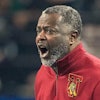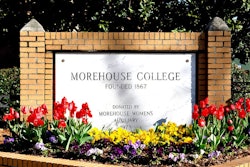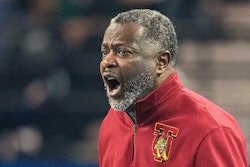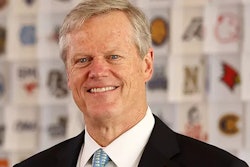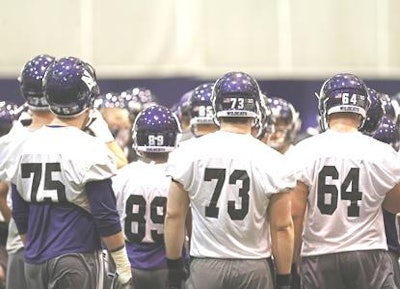
The board decided that asserting jurisdiction would not promote labor stability, which NCAA executive vice president of regulatory affairs Oliver Luck reminded “is very important to the NLRB.”
Conversations erupted across the media about what the decision means for the future of player compensation—many around the sports world have been closely following the Northwestern case because of a belief that it could set a nationwide precedent that would open the door for paying players—but many in the know on the details say the decision doesn’t actually mean much in the bigger picture.
First, said Dr. Eddie Comeaux, an associate professor of education at the University of California, Riverside, and a national scholar on issues surrounding collegiate athletics, the case is likely to escalate further to a federal court.
“Given what we’ve seen happen and the traction that we’ve seen,” Comeaux said, “we are unlikely to see the case die here.”
Second, it is critical to note that the NLRB “did not determine if the players were statutory employees under the National Labor Relations Act (NLRA). Instead, the Board exercised its discretion not to assert jurisdiction and dismissed the representation petition filed by the union,” as it was written in the decision document. This non-decision, so to speak, kicks the issue down the road to be debated by an entity under whose jurisdiction it actually would fall—like the courts.
The courts, Comeaux pointed out, have already begun to display a shift in “momentum [to be] clearly on the side of the athlete,” with recent victories, such as the O’Bannon ruling, clearing the way for a reconsideration of the definition of amateurism. (In O’Bannon v. NCAA, a district judge last year ruled against the NCAA in an antitrust suit that paved the way for players to be compensated for use of their names and likenesses.)
Still, Luck, who is a former athletic director at West Virginia University and the father of NFL quarterback Andrew Luck, said a lot of credit needs to be given to the Northwestern athletes for their role in spurring recent changes within the NCAA, including offering scholarships that cover the full cost of attendance, deregulated meal plans that allow the athletes to eat 24 hours a day “because they’re hungry,” increased attention to concussion screening and guaranteed four-year scholarships for athletes.
“I would give a lot of credit to the Northwestern student-athletes and to the folks that have supported them, because we’ve listened. The NCAA has listened,” Luck said.
“There is certainly more we can do for our student-athletes,” he continued. “We’re not quite there yet, but there’s a good understanding of what student-athletes want, and I think we’re moving in that direction.”
“We’ve seen a lot of momentum, a lot of reaction on the part of the NCAA to thinking about the well-being of athletes,” Comeaux agreed.
“These are really fronts that these major stakeholders who are really benefiting off of the backs of these athletes [are taking] to say they’re considering the athletes’ well-being,” he continued but added that more needs to be done in the direction of leveling what has become an extremely profitable playing field for the NCAA.
“The NCAA will continue to dance around it, they’ll continue to throw peanuts at it here and there … they’re going to continue to propagandize” the notion of alternative compensation and the definition of amateurism, Comeaux said.
But Luck, who has been a proponent for increased benefits for student-athletes, said he thinks a conversation about making them paid employees is “in the opposite direction of what people in collegiate athletics want to go.”
He is in favor of policies like offering better health care to athletes and guaranteeing scholarships but said he believes “there are very few people advocating for [putting athletes on the payroll] at this point.” Those involved with collegiate athletics don’t want to see the NCAA become another minor league feeder for professional sports, he said.
Comeaux acknowledges the idea that “athletes are already being paid” but said the question has become “are they being fairly compensated” for the effort that they exert and in the context of the amount of revenue the institutions—and the NCAA—are making on their backs. He accuses the NCAA of having “this sort of self-serving definition” of amateurism that he said “has continued to evolve over time as [the NCAA continues] to change that definition to suit their interests at the time.”
The question “is so much more than” one of “how much should they be paid,” Comeaux said. It is also one of race equity.
“There’s no question that there is a disparity in the number of athletes of color, specifically Black athletes, who are participating in collegiate athletics, especially in the revenue sports of football and men’s basketball,” Comeaux said.
Still, Comeaux admits that, although the NLRB’s decision not to rule in the players’ favor is a “minor blow,” he said he thinks “some of these other movements,” like the push for guaranteed scholarships, unrestricted meal plans, four-year scholarships and an increased emphasis on player health and safety, “will really influence some of the outcomes that I think the athletes are looking for.”
Luck said they already have.
“It’s important that [the Northwestern players and supporters] know that the ‘adults’—the athletic directors, the coaches, those of us at the national office—are listening,” he said.


